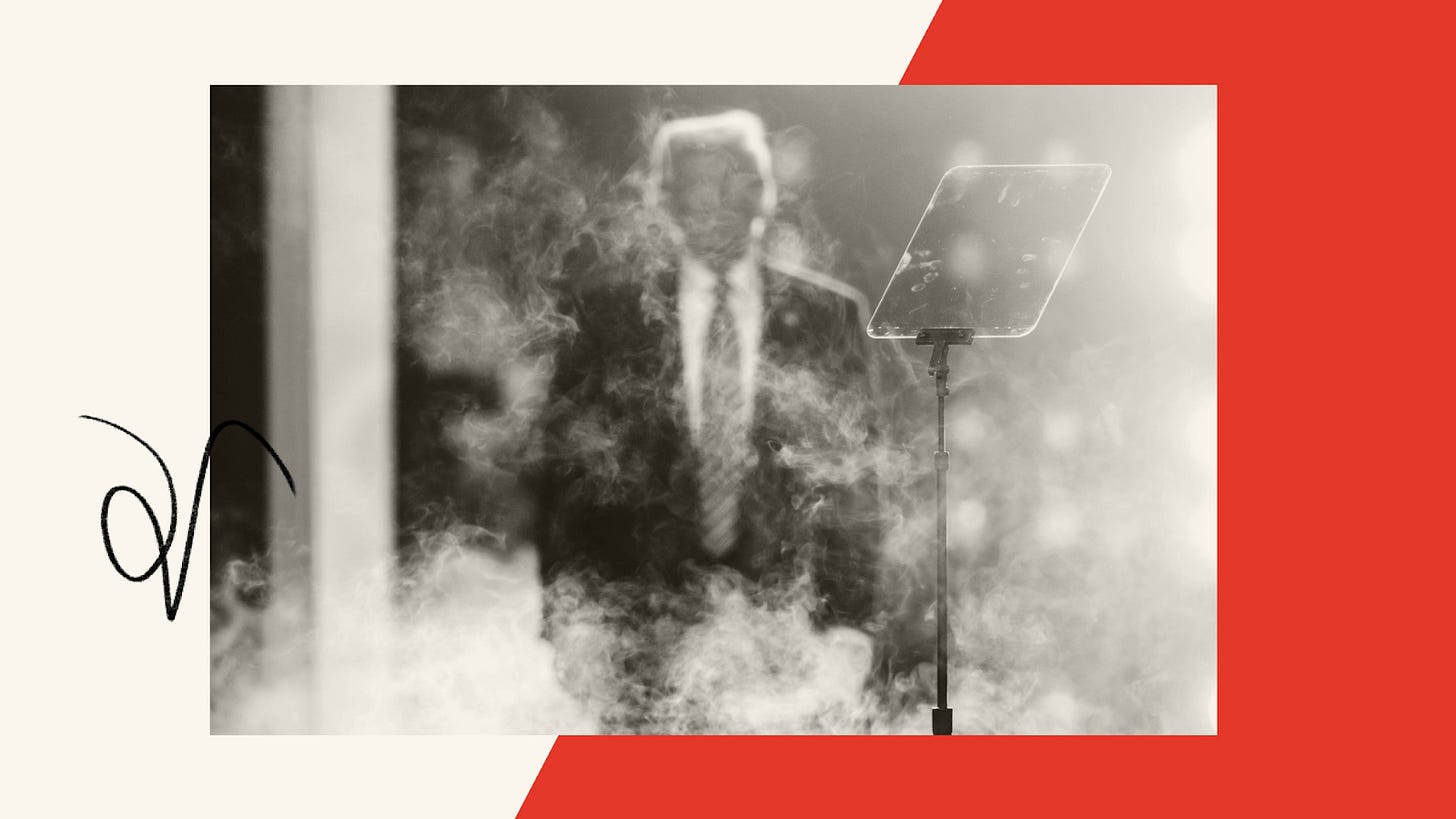The White House’s unreality window
Trump doesn’t just move the Overton window — he obliterates it
In this briefing we talk a lot about the political strategies behind autocracy.
Before Inauguration Day, we explained the big picture of shock and awe and how not to get lost in the noise (trust me, it’s been harder than I could ever have imagined). We’ve talked about how power is the driving logic — and fundamental weakness — of this administration. We’ve explored how the scandals can be deliberate, and why cruelty is central to the project, not incidental to it.
We’ve also talked about how thinking like autocrats can help defeat them, and why collective action is the only way democracy wins (and the self-interested strategy to boot). And we’ve argued that not only is the Trump administration losing a heck of a lot, but also that the overall strategy may already be failing.
This week, I want to cover the autocratic strategy on a more conceptual level. (Stay with me while I get metaphysical here. We’re going to talk about truth, reality, and politics.)
There’s an idea in political science called “the Overton window.” It’s the range of policy ideas generally considered acceptable. When leaders propose radical ideas, they can shift the window in one direction or another.
Modern autocrats employ this dynamic to an extraordinary new degree. They don’t just put forward radical ideas, they make claims that seem inconsistent with any shared conception of reality. In waging a war on truth, authoritarians like Trump don't so much shift the window — they obliterate it.
Alcatraz is a window into unreality
This week, after apparently watching the 1979 film “Escape from Alcatraz” (on PBS, no less), the president “announced” that he would be reopening the notorious prison in the San Francisco Bay to lock up “repeat Criminal Offenders [sic], the dregs of society.”
As a resident of Northern California, let me assure you: This can’t happen.
I don’t mean that in a political sense. I mean literally — it simply can’t be reopened. It’s a ruin. Here is what Alcatraz looks like up close:
Reopening Alcatraz is sort of like opening a prison on the moon or in the Colosseum or on the bottom of the ocean. Yes, maybe technically it could be done. But the idea is detached enough from practical reality that it’s not really worth discussing.
And yet, there are thousands of news stories discussing “Trump’s plan.”
To be clear, I’m not chiding the media here — I’m discussing this too! My point is: When the president and his supporters leave reality behind, we can’t help but follow them to at least some degree. We’re forced to reckon with the impracticalities and illegalities of it all. His critics attack the departure from reality and his allies defend it.
It doesn’t matter that (at least in this case) the proposal does not appear very serious. This process, the discussion itself, erodes our collective sense of shared truth. Add enough of these reality-benders together, and things start to get really scary.
Don’t believe your lying eyes
Consider all the different things claims from this administration that go against what — before the Trump era — we would have considered settled truth. Some examples:
That the executive branch has unilateral control over federal spending.
That the president saved 258 million people, three quarters of the population, from fentanyl overdoses.
That the president can erase birthright citizenship from the 14th Amendment.
That the U.S. might invade and annex Canada or Greenland.
That due process rights are somehow in doubt.
That the presence of undocumented immigrants constitutes an “invasion” by a foreign state.
That Ukraine started the war with Russia.
That Trump won the 2020 election.
That “there are methods” by which the president could serve a third term.
The effect is cumulative.
By consistently and dramatically going beyond the boundaries of the real or legal or practical, the White House is doing more than just driving the conversation into chaos. They’re opening the window to what should be absolutely unthinkable in this country. That the president can rule like a king. That there are no constraints on government power. That election results are only valid if they win.
Hold on to reality. It’s not going anywhere
This strategy is beatable only if we hold on to reality and refuse to let go. The Constitution is still the ultimate source of law in our country, regardless of what the president says or does. We can and do know who wins and who loses our elections. The plainly illegal will always be plainly illegal, even if powerful people claim otherwise. The obviously impractical and insane and un-American will always be those things, even if attempted by the White House. Even if those attempts are successful. None of that changes the truth.
For a great example of how truth can win, look at what the people of North Carolina accomplished this week.
Last November, one of the candidates for a state supreme court seat — Republican Judge Jefferson Griffin — lost to the Democratic incumbent Justice Allison Riggs by 734 votes. That was a fact. Two recounts confirmed it.
But Judge Griffin refused to accept reality. He filed over 300 challenges after the election seeking to change the election rules after the fact so that courts could install him in the seat instead. Eventually, with the backing of fellow Republicans in various state courts, Griffin settled on a mind-boggling move: attempting to steal the election by voiding active duty military votes.
As Victoria Bullock and Ben Gips wrote:
Put simply: State courts have ruled that to have their vote counted, military voters should have done something that they were not required to do (and was in fact impossible to do). And because they did not do so, they are now being retroactively disenfranchised, five months after the fact. How does this make any sense?
Despite the un-reality of it all, North Carolinians refused to accept this attack on truth. They spoke up on social media, in the media, and at rallies. They packed “The People v. Griffin” rallies and courtrooms across the state. Former senior military leaders and veterans raised the alarm on the attack on military voters.
And they sued to protect their votes. (Protect Democracy, along with co-counsel, represented them in this case — details here.)
This week, those voters, along with Riggs, won in federal court. Judge Richard E. Myers, a Trump appointee, definitively ruled that Griffin’s gambit was unconstitutional.
On Wednesday, Griffin conceded — and not just to Justice Riggs, but to reality itself. Because no matter what happens, no matter how badly the window around reality has been twisted and distorted, the truth is still the truth.
We just have to hold on long enough. It will prevail.
The Supreme Court to decide the fate of your data
The White House is desperately pushing the Supreme Court to grant DOGE access to Social Security data. An exposé from the Washington Post this week indicates why:
The U.S. DOGE Service is racing to build a single centralized database with vast troves of personal information about millions of U.S. citizens and residents, a campaign that often violates or disregards core privacy and security protections meant to keep such information safe, government workers say.
Here’s Kristy Parker, who leads our Privacy Act case against DOGE (read about our lawsuit and the Privacy Act here):
When the administration says that they're suffering "ongoing, irreparable harm" to "urgent federal priorities," what they really mean is that legal challenges are preventing DOGE from vacuuming up "all data across government" into one convenient (and potentially very risky) location.
It’s a security nightmare (not to mention likely violates the Privacy Act) — especially troubling given whistleblower reports of DOGE staffers showing up at agencies with unsecured laptops, demanding administrator-level access, and sometimes even turning off the systems that track who's accessing what.
So what’s the real reason for the rush? This administration has shown us they understand that more data means more power. And, in this case, profit. Access to reams of our most sensitive information means tipping the scales towards certain potentially autocratic-minded billionaires in the battle for the spoils of AI.
The race to the Supreme Court suggests they'd like to establish the legal right to our data as a first step.
What else we’re tracking:
In politicizing national security and governing by emergency, the White House is rapidly eroding civil-military relations, write Jon Steinman, Rebecca Lullo, and Ariela Rosenberg: 55 years after Kent State, Donald Trump courts another disaster.
A new poll finds that most Americans use federal science information — the same science being actively gutted — on a weekly basis.
The White House has proposed the creation of a “sovereign wealth fund.” As Grant Tudor writes, the possibilities for abuse if that happens are pretty staggering.
The Trump administration is preparing to launch a “gold card” visa program, which would not be lawful unless authorized by Congress. Will the administration attempt to do so anyway?
This week, the U.K. held local elections; the far-right Reform UK party surged. Farbod Faraji looked at the results and found a surprising conclusion: Party systems are less stable than they seem.
The Supreme Court allowed, for now, the White House to carry forward its discriminatory ban on trans people in the military. It did not explain its reasoning. (Read more on how authoritarians target trans and nonbinary communities.)
A court ruled that Rümeysa Öztürk, the Tufts student who was detained for six weeks apparently for writing an op-ed, must be immediately released on bail.
Lots of purges this week. The president fired the librarian of Congress (amid an effort to ban and restrict access to books about certain topics the administration disagrees with), the acting FEMA chief (amid an effort to potentially shutter the disaster-response agency), and three members of the Consumer Products Safety Commission (amid an effort to seize control of all independent agencies).
Read this from Steven Levitsky, Lucan Way, and Daniel Ziblatt. And then send it to everyone you know: How will we know when we have lost our democracy?
Your moment of collective courage
Congress — yes, that’s right — is starting to stand up for its power of the purse, with bipartisan appropriations leaders standing up for apportionment transparency (read the backstory on this issue and our lawsuit here). It’s small, but it’s a start.
Have other examples of collective courage you think people should know about? Let us know in the comments below and on social media using the hashtag #CollectiveCourage.






Thank you for writing this!
I was just thinking yesterday about the Overton Window and how this regime is using it!
Beautifully written, wise, helpful & hopeful essay!
Can the Overton window work the other way?
For example, I want to expand SNAP and WIC AND raise the minimum wage so that government (food support) and the business community (higher worker pay) obliterate hunger in this country.
No more hunger! No food insecurity! It’s so easy and cheap and the right thing to do!
America with no food insecurity tomorrow! Let’s do this! We have the money! And elders and kids are facing very high levels of food insecurity. Let’s fix this!